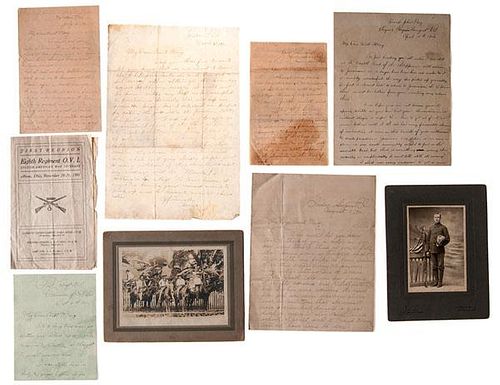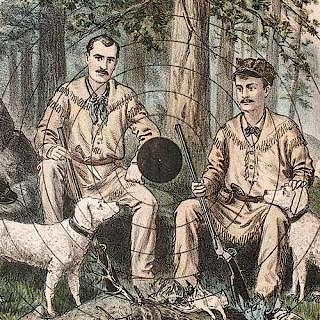George Paul, 8th Ohio Volunteers, Spanish American War Archive, Plus
About Seller
6270 Este Ave.
Cincinnati , OH 45232
United States
With offices in Cincinnati, Cleveland and Denver, Cowan’s holds over 40 auctions each year, with annual sales exceeding $16M. We reach buyers around the globe, and take pride in our reputation for integrity, customer service and great results. A full-service house, Cowan’s Auctions specializes in Am...Read more
Two ways to bid:
- Leave a max absentee bid and the platform will bid on your behalf up to your maximum bid during the live auction.
- Bid live during the auction and your bids will be submitted real-time to the auctioneer.
Bid Increments
| Price | Bid Increment |
|---|---|
| $0 | $25 |
| $500 | $50 |
| $1,000 | $100 |
| $2,000 | $250 |
| $5,000 | $500 |
| $10,000 | $1,000 |
| $20,000 | $2,500 |
| $50,000 | $5,000 |
| $100,000 | $10,000 |
About Auction
Nov 20, 2015 - Nov 21, 2015
Cowan's Auctions dawnie@cowans.com
- Lot Description
George Paul, 8th Ohio Volunteers, Spanish American War Archive, Plus
Lot of approx. 29 items, ca. 1891-1908.
Theodore Roosevelt's "splendid little war," The Spanish American War, sparked a second three-year war with the Philippines. Following the examples of the men in his family before him, George H. Paul enlisted in the 8th OH Vols. for the Spanish-American and War and the Philippine-American War. The archive contains many of his letters during his service in the Philippines from 1899-1908 addressed to his aunt, Mary Paul.
The war waged in the Philippines was much different than previous wars. Guerrilla tactics were especially important to Filipinos verses skirmishes on a defined battlefield. When George arrived in Caloocan December 14, 1899 he wrote:
[Filipino men] are very poor soldiers and worse Marksman- but still they can fight in their own peculiar way and once and a while they manage to fill a stragling american soldier still while they are killing one of our men we kill 20 or more of theirs...the last news from the fight got in here just at noon and the result was very good 12 U.S. men wounded and 2 killed. the rebel losses reached up into 300 dead and 500 wounded. My company did not get into the fight but bullets flew close around us as we went out to support our troops.
The presidential elections in 1900 were never more important to a war since the second election of Lincoln. George writes that Filipino insurgents laid their weapons down until the end of the election because "Bryanites" told [Filipino] leaders that if William Jennings Bryan won they would be given their freedom...and let them do as they please (Paul, October 1, 1900). If William Jennings Bryan won, the Philippines would be independent for the first time since its discovery by Ferdinand Magellan in 1521. If William McKinley won and the war resulted in an American victory, it would be a resounding message to the world that the United States was an imperial power. George wrote to his aunt, I dread this election as I never dreaded the sound of whistling bullets and long marches for if we loose in this campaign our Nation is Ruined forever and [?] will be trampled on by other nations...(October 1, 1900). McKinley won the nomination and the battle ensued for several more years.
Public support for the war dissipated and many protested against it. The government declared the end of the war in 1902 but fighting continued in organized resistance until 1906 and sporadic fighting until 1913. George grew increasingly tired of his own involvement. He vented his frustrations to his aunt from Luzow on April 15, 1906:
I am not a politician I imagine the sooner the U.S. gets a new administration regarding this bunch of grafters of whom our amiable man from "Ohio" "Taft" as the leader, the better we are literally wasting billions of good dollars here only to fall in the purses of rich men as are in favor with the rather large but unjust leader of this corrupt, yes the, I am sorry to say it, most corrupt government in this world, congress is next to some of the moves now, when they burned down the appropriation of $50.000000 for fortifications-Theres no need of fortifications here- no nation under the sun is foolish enough to take or even try to take such a burden on their hands as the Philippines...I shall do my part in the "lid lifting" if I get out of this damnable, miserable country, with a remnant of my power of speech...
George finally returned to the United States in 1908.
Also included in the lot are two silver gelatin photographs related to John Harvey Bordner. Bordner was one of the thousands of American men fighting against Emilio Aguinaldo and his army of Filipino nationalists. He was a chubby young boy, ready to make himself a man on the battlefield. He enlisted for three years of service at the age of 19, but lied on his papers and claimed he was 23. He mustered into the 27th Inf. on June 30, 1899. The two photographs offered here include a patriotic portrait of Bordner in his uniform taken by Johnson in San Francisco, CA before he embarked. The second is an image of four men on horseback, inscribed on verso, Reminiscence to Will B./ from your brother/John H. Bordner/ on this left. If this photograph indeed shows Bordner at left, the Philippines dramatically changed his boyish looks to the appearance of a rugged man.
The remaining items are letters from the Paul family to their beloved Aunt Mary, a map of the world, one additional silver gelatin photo, three programs from the 2nd Reunion of H.K. Taylor and Pupils dated 1891, and a program from the 1st reunion of the 8th OH Inf. dated 1901.Many of the letters are in very good condition as are two of the three images. Several letters are incomplete and the map is completely separated.Condition
- Shipping Info
-
SHIPPING. At the request of the buyer, Cowan's will authorize the shipment of purchased items. Shipments usually occur within two weeks after payment has been received. Shipment is generally made via UPS Ground service. Unless buyer gives special instructions, the shipping method shall be at the sole discretion of Cowan's Auctions, Inc.. Cowan's is in no way responsible for the acts or omissions of independent handlers, packers or shippers of purchased items or for any loss, damage or delay from the packing or shipping of any property.
-
- Buyer's Premium



 EUR
EUR CAD
CAD AUD
AUD GBP
GBP MXN
MXN HKD
HKD CNY
CNY MYR
MYR SEK
SEK SGD
SGD CHF
CHF THB
THB











